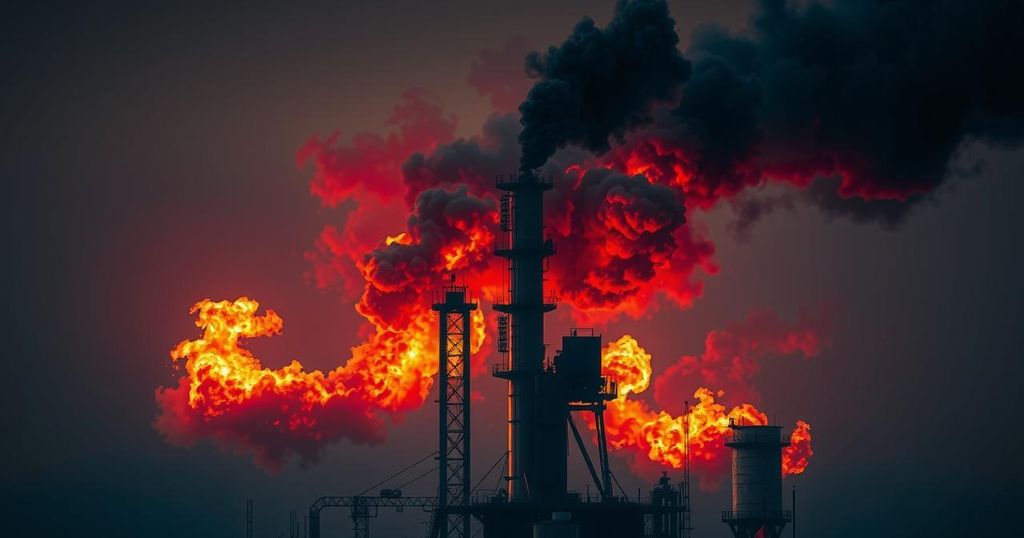Recent fighting in Sudan has led to the burning of the largest oil refinery, with both military factions blaming each other for the destruction. Satellite imagery has confirmed extensive damage, raising environmental concerns. The conflict has roots in a failed transition to democracy and has resulted in a humanitarian crisis, with increasing casualties and displacement.
Fighting in Sudan has escalated, resulting in significant damage to the country’s largest oil refinery, as per satellite imagery analyzed by media sources. This complex, situated 60 kilometers north of Khartoum, became embroiled in conflict as forces loyal to military leader General Abdel-Fattah Burhan claimed to have captured it from the rebel Rapid Support Force (RSF), exacerbating an already dire civil war situation.
The al-Jaili refinery, capable of processing 100,000 barrels of oil per day, has long been a strategic target since RSF claimed control in April 2023. Attacks leading to significant fires were detected through NASA’s satellite data, revealing extensive damage and thick, black smoke emanating from the site, which poses severe respiratory and environmental risks to the nearby populations in Khartoum.
Accusations between the Sudanese military and the RSF have intensified, with each side blaming the other for the refinery’s destruction. The Sudanese military claims the RSF set the oil facility ablaze, whereas the RSF retaliated by alleging that the military had bombed it with explosive munitions from aerial vehicles, thus unsubstantiated claims circulate amid the ongoing conflict.
In the wake of this violence, the UN Secretary-General expressed alarm over the escalation of hostilities, urging all parties to cease actions detrimental to Sudan and its citizens. The loss of this vital refinery could lead to dire economic ramifications, compelling Sudan to depend on expensive fuel imports amidst a growing humanitarian crisis caused by the war that has displaced millions and resulted in significant casualties.
The instability in Sudan traces back to 2019 when a popular revolt led to the removal of long-time dictator Omar al-Bashir. However, the transition to a democratic government collapsed following a military coup led by General Burhan and RSF leader General Mohammed Hamdan Dagalo in 2021 and has since devolved into widespread conflict.
As the civil war continues, other dire estimates assert there may be far more than 28,000 fatalities, with many Sudanese facing severe famine conditions. Moreover, the recent violence further jeopardizes any progress towards international attempts at mediation, reflecting a grim outlook for the immediate future of Sudan and its people.
The conflict in Sudan has deep historical roots extending from military control to ethnic strife. Following the ousting of Omar al-Bashir in 2019, the country briefly sought a transition to democracy, which collapsed due to a military coup in 2021. Since then, the war has intensified between Sudan’s military and the RSF, leading to widespread violence, humanitarian crises, and the targeting of essential infrastructure such as oil refineries. Recent turbulence around the al-Jaili refinery underscores the devastating impact of this ongoing conflict.
In summary, the clash between Sudan’s military and the RSF has resulted in the fiery destruction of the al-Jaili oil refinery, signifying a pivotal moment in the ongoing civil war. The allegations exchanged by both military factions highlight the chaotic nature of this conflict, while the UN’s concerns for the humanitarian impact further underline the urgency of resolving the crisis. The potential loss of this refinery poses a significant threat to the economies of Sudan and South Sudan, exacerbating the dire humanitarian situation.
Original Source: www.cnn.com






